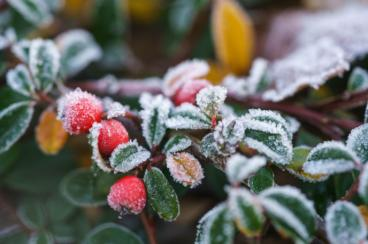
The traditional Chinese solar calendar divides the year into 24 solar terms. Start of Winter, (Chinese:立冬), the 19th solar term of the year, begins this year on Nov. 7 and ends on Nov. 22. Start of Winter is the first solar term of winter, which means winter is coming and crops harvested in autumn should be stored up. ____1____
Beginning of winter or not
In ancient times, the Chinese people took the Start of Winter to be the beginning of the winter. ____2____ The general weather conditions every year are different, so the beginning of winter could be quite different. And with the vast territory of China, winter of every area doesn’t begin at the same time.
Eating dumplings
There was a legend about the custom. The legend is about “Medical Saint” Zhang Zhongjing at the end of the Eastern Han Dynasty (AD25-220). ____3____ How? He cooked mutton, hot peppers and herbs(药草) to beat the cold and increase body heat. He put these things into a dough skin and made them into an ear shape. ____4____ Today there is still a saying that goes “Eat dumplings on Start of Winter Day, or your ears will be frostbitten (生冻疮的)”.
Eating Chinese pumpkins
In Tianjin, on the first day of Start of Winter, people eat dumplings stuffed with Chinese pumpkins. The pumpkin is a common vegetable in northern China. Generally, the pumpkins are bought in the summer. ____5____
A. However, it is not the beginning of winter in terms of meteorology (气象学).
B. He saved many people in Henan province from coldness around Start of Winter.
C. The four beginnings of the seasons were important festivals in ancient times.
D. Here are something you should know about Start of Winter.
E. On the first day of Start of Winter, there is a custom, “nourishing the winter”.
F. And it is stored until the Start of Winter when they are taken out.
G. Since then, people have learned to make the food which became known as “dumpling”.
1.1.
A
B
C
D
解析:选D。D 根据下文内容可知,本句旨在引出下文对冬至的介绍。选项D“这里有一些你在立冬应该了解的事情”最符合上下文语境。故选D。
2.2.
A
B
C
D
解析:选A。A 根据后面的“The general weather conditions every year are different, so the beginning of winter could be quite different. And with the vast territory of China, winter of every area doesn’t begin at the same time.”可知,每年的气候都不一样,所以冬天的开始可能会很不一样。而且中国幅员辽阔,各地的冬天并不是同时开始的,与本段第一句描述的“在古代,中国人把立冬当作冬天的开始”形成语义上的转折,因此这里填入一个句子表转折。选项A“然而,从气象学的角度来看,冬天的开始并都不是它(立冬)”最符合上下文语境。故选A。
3.3.
A
B
C
D
解析:选B。B 根据后面的“He cooked mutton, hot peppers and herbs to beat the cold and increase body heat.”可知,他通过煮羊肉、辣椒和一些草药来给大家驱寒取暖。选项B“他救了许多河南人,帮助他们在立冬时免于流行伤寒”符合语境。故选B。
4.4.
A
B
C
D
解析:选G。G 根据前面描述的他通过煮羊肉、辣椒和一些草药来给大家驱寒取暖。他把这些配料包在一个面皮里,做成耳朵形状。今天仍然有一个说法,“在初冬吃饺子,否则你的耳朵会被冻伤”。选项G“从那时起,人们就学会了包饺子”最符合上下文语境。故选G。
5.5.
A
B
C
D
解析:选F。F 根据前面的“Generally, the pumpkins are bought in the summer.”可知,在天津,在立冬的第一天,人们吃南瓜饺子。一般来说,南瓜是在夏天买好的。选项F“然后储存到冬天开始的时候再取出来(食用)”最符合上下文语境。故选F。